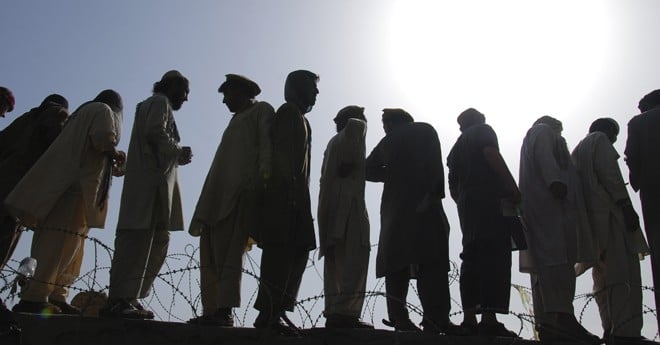
Soundbites from the IDPs in Karak about the problems in relief operations and other things

I recently had the opportunity to visit the district of Karak, which is 40 kilometres from Bannu, to have a closer look at the effects of the war and help out in relief activities. I did not go there to answer the difficult questions such as the justification of the military operation or the claims of negotiations by pacifists. I went there to look at the human cost of war.
Pakistan is at war with an enemy that has seeped into the ranks and minds of our beloved countrymen. Our war is with those who now roam around the streets of some of our cities, towns and villages. This war has had a direct socio-economic impact on the people of Pakistan especially those living in the strongholds of the terrorists, such as North Waziristan.
I decided to visit the IDP camps with a non-governmental organisation, which is one of the many such working for the welfare of the people. About seven to eight hundred families had made their way for Karak after the commencement of the military operation. Unfortunately, the government’s attention in the earlier days was only directed towards the district of Bannu. This led to the neglect of the adjoining districts that housed thousands of displaced people who have come to be known as IDPs.
To my surprise, there were no campsites similar to those established after the earthquake of 2005 or the floods of 2010. The IDPs resided in vacant schools or hospitals. Some even set up their temporary shelters in unoccupied buildings. This situation posed a lot of issues related to the efficient and just distribution of the relief goods. It was hard to find the IDPs that were scattered all across the district and it was even harder to distinguish the local population from the affected people.
The government officers helped us with spreading the news about our activities; they also began a process of registering the families so that there was no double dipping.
I had the opportunity to interact with a few of these brave souls who gave up their homes for the greater good of our nation. I realised that IDPs include people from all kinds of social strata. They may be rich and noble according to their own rural standards or they may be very poor. One of the families that I came across was very well off. The family head remarked, "We had five gardens and three departmental stores, and we did not want to leave at all". However, the psychological trauma faced by his grandchildren who could not sleep at night forced him to evacuate and leave all his belongings and livestock behind. Stripped of all his hard earned privilege and respect, he now stands in the same queue as the others.
I mingled with the children of another family. Some of the very young ones did not even know why they had abandoned their homes. Muhammad Azhar, who was merely 7 years old, was surprisingly optimistic that he would go back to his school in a few months. His optimism may be considered childish in such uncertain times but his willingness to go back is no different from any of us who have hopes attached with the Pakistani army.
Most of the women and children did not know how to converse in Urdu except for the adult males. Volunteers from the indigenous population helped the relief workers in such times. They not only helped us in engaging with the female population directly so that we could learn about health issues among the children but they also helped us identify the IDPs and differentiate them from the locals.
The scorching summer heat does not spare the IDPs or the relief workers. About two weeks back, temperatures soared above forty degrees Celsius in those areas. Some who could not afford transportation had to walk miles in the dry summer heat before they reached their destination. Ironically, most of the fleeing Waziristanis did not even know that this was to be their destination. One can wonder about the level of uncertainty that they faced when they left their homes.
Sometimes uncertainty becomes their worst enemy in such troublesome times because according to one of the adults, "we do not even know how we are going to survive this coming week and you ask me if we are hopeful about going home."
Some say that those who die in a conflict are better off than those who survive. In my opinion, this is a premature statement. It is a sentence that epitomises hopelessness and despondency. I witnessed the opposite emotions when the seven-year-old Azhar smiled and assured me that he would go back home in the coming days.
As a nation we have survived floods that covered one-fifth of out land mass and earthquakes from the north to the south in the last decade. Somehow, Pakistan always manages to stay afloat in the treacherous sea of problems. However, it is time we realised that barely staying afloat is not enough; time has come for us to take charge and sail our way through these problems.
How are we going to make that happen for now? By doing as much as we can for these people through our donations and support. We have to make them feel no less than a citizen of this state. This is the battle behind the frontline that we must win.